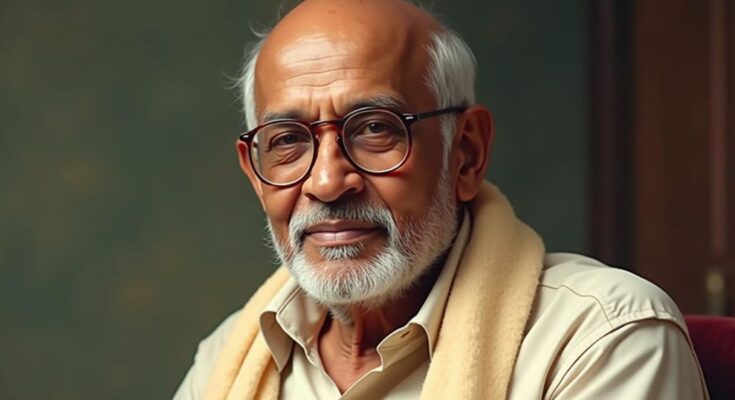G N Saibaba, a renowned human rights advocate and former professor, passed away following surgery complications. After being imprisoned for alleged Maoist ties, he was released in March this year. Saibaba detailed his torturous experiences in prison, advocating for human rights and healthcare access.
On a somber Saturday, the world lost a bright beacon of human rights advocacy, G N Saibaba, a former Delhi University professor who died due to complications after gallbladder surgery. At 58, Saibaba was not only a wheelchair-bound scholar but also a symbol of resilience, having endured years behind bars on unproven allegations of Maoist affiliations. Convicted and sentenced in 2017, his declaration of innocence finally came to fruition on March 7 of this year when he was granted freedom, reopening the doors to life after nearly a decade of walls that confined both body and spirit. In a poignant press conference shortly after his release, Saibaba recounted the harrowing decade spent in incarceration, unable to bid farewell to his ailing mother while the prison walls loomed large in his memory. His voice, laden with the weight of grief and loss, echoed, “I couldn’t see my mother one last time before her death because I was denied parole. This is a denial of basic Human Rights.” Reflecting on this profound absence, he revealed the sacrifices made by his mother, who had diligently carried him to school during his early years, instilling in him a thirst for education despite the burden of his disability. Saibaba’s liberation was bittersweet, marred by the toll prison life had exacted on his health. “I still can’t believe that I am out, I am free,” he recounted, yet his spirit bore the scars of confinement. What once was a healthy life, buoyed by determination and intellect, had transformed into a state of frailty marked by numerous ailments, from hypertension to severe spinal conditions. “Each part and organ of my body is in a critical condition now. I can’t eat and digest food now,” he lamented, painting a grim picture of a body ravaged by years of neglect amidst the metal bars that held him captive. His distressing experiences in prison also revealed the inhuman treatment meted out to him. “Despite knowing that I have polio, which is mainly associated with my legs, I was dragged by my legs and thrashed on my legs,” he recalled, while the lingering image of swollen limbs etched itself in the minds of all who listened. He underscored the heart-wrenching failure of the authorities to provide adequate medical care, revealing, “The jail authorities didn’t provide me with the treatment when multiple times my heart rates dropped to a point where the doctors suggested that I would not survive.” With each recollection of his unjust imprisonment, Saibaba became a vessel for change, echoing the urgent call for reform and compassion within India’s penal system, raising awareness of every soul imprisoned unjustly under the aegis of authority. Once an English professor at Ram Lal Anand College, where he inspired countless students and engaged passionately with literature, his legacy remains a mixture of enlightening teachings and a relentless fight for justice.
G N Saibaba’s life story is intertwined with the broader narrative of human rights struggles in India. His arrest in 2014 under allegations of Maoist sympathies sparked public outcry and raised crucial discussions about state repression and the treatment of disabled individuals in custody. A professor associated with Delhi University, Saibaba’s academic contributions were overshadowed by the overarching political climate that led to his long incarceration without substantial evidence against him. His eventual release brought to light the numerous human rights violations faced during his imprisonment, a poignant chapter representing the plight of many who suffer under unjust legal systems. Saibaba’s experiences serve as a stark reminder of the ongoing battles faced by human rights defenders in contemporary society.
G N Saibaba’s death marks a tragic end to a life dedicated to advocating for human rights and justice. His journey through suffering and resilience provides a profound illustration of the struggles faced not only by individuals in the penal system but also by marginalized communities. His call for compassion and reform serves as a reminder to keep fighting against injustices that continue to persist in society. Saibaba’s legacy as a champion for human rights will continue to resonate, urging future generations to uphold the ideals of freedom, dignity, and equality for all.
Original Source: maktoobmedia.com



